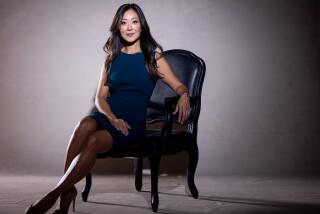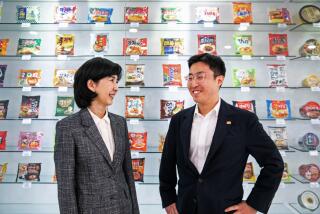POWER ON THE PACIFIC RIM : Profiles : 10 Pacific Rim Giants Tread Own Paths to Influence : Chung Ju Yung: Strong-Willed, Self-Taught
- Share via
SEOUL — One is the illegitimate son of a wealthy industrialist. The foundation of another’s fortune was a long-ago U.S.-backed loan.
A third is a notorious high-stakes gambler liable to risk millions of dollars in a day at the racetrack, while yet another furnishes his house in plastic.
A capitalist who backed a revolution is on the list, as is a refugee from communism who is now devoting much of his energy to courting his giant Communist neighbors.
They’re all among the wealthiest and most influential businessmen in Asia--10 titans of the Pacific Rim. Not surprisingly, several of them have extremely close ties to the political leaders of the region. Five are ethnic Chinese. Six were born to wealth, but four others started from little or nothing.
Meet a diverse group of business leaders likely to continue having a strong influence on the shape of the region:
Waves and strong ocean currents had halted a land-fill project undertaken by the big Hyundai Group on the west coast of South Korea. Earth and rocks dumped into the ocean were repeatedly washed away.
Chung Ju Yung, founder of the group, which claims more than $32 billion in sales annually, listened as the president of his construction company, an engineer with a Ph.D. from an American university, confessed that he knew of no way to cope with the problem.
“Fill an oil tanker with water and place it across the mouth of the bay. That will break the current,” said Chung, whose education ended in grade school.
“But the ship may break up,” the construction company president protested.
“Just do it!” Chung ordered. It was done. And the problem was solved.
“Ph.D.s? What do they know?” Chung muttered. Ultimately, the construction company president resigned.
The story, reported in the Hyundai Group company newspaper, typifies the strong-willed, 75-year-old, self-taught business leader--the son of a poor farmer, who built a small construction company into one of the world’s largest conglomerates with little more than horse sense and his own hands. Today, Hyundai builds cars and ships, carries out massive overseas construction projects and has moved into electronics and high-tech.
His detractors deride Chung for imbuing his conglomerate with a construction-industry mentality: shrewd in bulk and tonnage but clumsy in delicacy and miniaturization. Hyundai, critics note, has been left in the dust in semiconductor manufacturing by both of its two Korean rivals.
Admirers counter that the Hyundai founder personifies the dynamism and risk-taking spirit that has brought South Korea to the brink of advanced industrial status.
Within his business empire, Chung is reputed to rule with an iron fist--more so than even the country’s authoritarian rulers, who turned to him in the 1960s and 1970s to help save the war-devastated economy. His Hyundai Group is considered to have the worst labor relations of any Korean conglomerate.
The quintessence of the family chaebol (conglomerate) owner, Chung had eight sons, all of whom served as executives or presidents of Hyundai firms. Two of the sons have died--one in an auto accident and one a suicide.
Chung Se Yung, a brother, serves as chairman of the Hyundai Group, while another brother, Chung In Yung, fell out with him and set up his own conglomerate, the Halla Group, which itself claimed sales of $1.4 billion last year.
A refugee who, like 6 million other South Korean residents, fled North Korea after it was communized, Chung Ju Yung commands assets estimated in the billions of dollars.
Government officials credit the Hyundai founder with financing the final push that gave his country the 1988 Olympics--an all-out lobbying effort in Baden-Baden, West Germany, where the International Olympic Committee chose underdog Seoul over favored Nagoya, Japan.
More recently, Chung has promoted nine development projects in the Soviet Union, some of which, he says, could expand into tripartite or quadripartite cooperation with China and North Korea. Chairman of the Korea-Soviet Union Economic Assn., he has been credited with helping persuade Moscow to establish diplomatic ties with Seoul, despite its military alliance with Communist Pyongyang.
He is the only South Korean businessman to have paid an official visit to North Korea, and last fall Chung traveled to Beijing for the first time.
More to Read
Inside the business of entertainment
The Wide Shot brings you news, analysis and insights on everything from streaming wars to production — and what it all means for the future.
You may occasionally receive promotional content from the Los Angeles Times.










